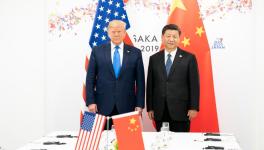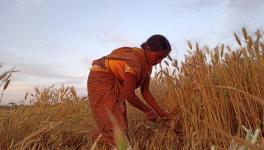World Tuberculosis Day: The Patent and PIL Fight in India for Accessible Drugs
Representational use only.
‘The Clock is Ticking’. It is the theme for this year’s World Tuberculosis Day (2021) – marked every year on March 24 – conveying “a sense that the world is running out of time to act on the commitments to end TB made by global leaders,” says the World Health Organization. Who would know the gravity of the theme better than patients of the disease and activists fighting not just the disease per se, but also for access to medicines and treatment for the disease.
A preventable and curable disease, TB kills nearly 4,000 people every day and close to 28,000 people fall ill with it across the globe. One of the targets under the Sustainable Development Goals (SDG) is to eliminate TB by 2030. India has a more ambitious target in place to end TB by 2025 and had drawn out a ‘National Strategic Plan for Tuberculosis Elimination’ between 2017 and 2025. However, at present, India accounts for nearly a quarter of the global burden of TB cases.
Impact of COVID-19 Pandemic on TB
In India, the total number of notified patients during 2019 was about 24.04 lakh. The Ministry of Health and Family Welfare (MoHFW) claimed that “For the period Jan to Dec 2020, 18.03 lakh TB cases were notified which is 25% less than 24.04 TB cases reported in 2019”.
As per preliminary data compiled by World Health Organization (WHO) from over 80 countries, an estimated 1.4 million fewer people received care for TB in 2020 than in 2019 – a reduction of 21%. “The countries with the biggest relative gaps were Indonesia (42%), South Africa (41%), Philippines (37%) and India (25%),” it said.
In India, a number of reports point out that essential TB services were hit due to factors such as reallocation of human, financial and other resources from TB to the COVID-19 response. Research Studies have found “considerable disruption in TB service provisions both in the primary care and hospital settings” during the COVId-19 pandemic. As per the data available from the Nikshay Dashboard, there was a clear decline in the notifications during the lockdown months (especially, March, April and May, 2020).
Figure 1: Total Notifications of TB cases in India (Monthly)
Note: The data includes notifications in both public and private sector
Source: Compiled from the Nikshay Dashboard (accessed on March 23, 2021)
As per the WHO Global TB Report (2020) there were large drops in the reported number of people diagnosed with TB between January and June 2020 in India. Moreover, “the economic impact of the pandemic is predicted to worsen at least two of the key determinants of TB incidence: GDP per capita and undernutrition”.
(Non-) Access to Affordable Medicines – Thanks to Patents
One of the major challenges in dealing with TB has been the treatment of drug resistant TB – Multi Drug Resistant (MDR)/ Rifampicin Resistant (RR) and Extensively Drug Resistant (XDR) TB; Drug-resistant TB has been recognised by the WHO as a public health threat. India tops the list of countries and accounts for about 27% of the global MDR/RR TB cases. After a gap of more than 40 years, new medicines for the treatment of drug resistant TB such as Bedaquiline and Delamanid were developed. The WHO advocated for the replacement of injectables with fully oral therapy for drug resistant TB using these new medicines. The older regimen had severe side-effects and the new drugs are also more effective in treating the MDR/RR TB. WHO Model List of Essential Medicines (2019) includes Bedaquiline and Delamanid.
However, the cost of these medicines is exorbitant. In India, a six-month course of Bedaquiline costs about Rs 25,000 per person, which would increase three times in the case of an extended regimen for 18 months. With Delamanid, a six-month course costs more than Rs 90,000 per patient. Until now the National Tuberculosis Elimination Programme (NTEP) in India relied on donations to meet the public health demands of both drugs from their manufacturers. Janssen Pharmaceuticals (Johnson & Johnson) has been granted a patent in India that covers Bedaquiline until July 2023 and Otsuka Pharmaceuticals has been granted a patent that covers Delamanid valid until October 2023. As a result, alternate suppliers are excluded from producing and making lower cost generic versions of these drugs, which are available.
One research study (2017) estimating generic prices for novel TB drugs found that generic prices were between 87%-94% lower than the then lowest available prices for Bedaquiline, and 95%-98% for Delamanid. This means that for a six-month course the exorbitantly priced patented medicines can actually be made available at much lesser prices. The study conclude that competitive large-scale generic manufacture could allow supplies of treatment for five to ten times more MDR-TB cases within current procurement budgets.
PIL Seeking Grant of Compulsory License/Government Use Authorisation
Recently, a public interest litigation (PIL) was filed in the Bombay High Court to ensure access to new TB drugs for people living with MDR and XDR TB in India. The PIL, filed by two Mumbai-based TB survivors – Meera Yadav and Brinelle D’Souza (petitioner on behalf of the Jan Swasthya Abhiyan, Mumbai), sought the grant of Compulsory License/Government use Authorisation for Bedaquiline and Delamanid under The Patents Act, 1970. The PIL makes the MoHFW, the NTEP, the State of Maharashtra, and the Brihan Mumbai Municipal Corporation, parties to the matter. The petitioners had earlier filed a representation for such a grant with the MoHFW and Ministry of Commerce and Industry in November 2020.
The Bombay HC, on March 10, directed the Central Government (Department of Promotion of Industry and Internal Trade), to pass an order by April 28, 2021 on a representation asking it for ‘compulsory licenses’ to import the two patented life-saving anti-TB drugs.
Compulsory licenses are authorisations given to a third-party to make, use or sell a particular product or use a particular process which has been patented, without the need of the permission of the patent owner, however, under certain conditions. These are one of the flexibilities provided under the Trade-related Aspects of Intellectual Property Rights (TRIPS) agreement under the World Trade Organisation (WTO).
In the petition, D’Souza argued: “India contributes to one-fourth of the global burden of MDR-TB and within India, Mumbai is a hotspot for MDR-TB which has major public health implications. For persons living with MDR/RR and XDR-TB access to Bedaquiline and Delamanid is a matter of life and death. It's simply untenable for the NTEP to solely rely on donations for these drugs when there are a huge number of People Living with MDR/RR/XDR-TB. The case fatality rate of DR-TB is much higher than Covid. We hope that the government will issue a Compulsory License or Government Authorisation for Bedaquiline and Delamanid as soon as possible.”
In fact, in 2019 the Report on the review of Programmatic management of drug-resistant tuberculosis (PMDT) component of the Revised National TB Control Programme (RNTCP), India had recommended initiation of “in-country discussions regarding licensing under the Patents Act of the ‘new’ drugs (e.g. Bedaquiline and Delamanid) i.e. allowing for generic manufacture and supply, for reducing price and improving access”.
Meera Yadav, a TB-survivor, and one of the petitioners, said: “I am a survivor of XDR-TB, which means that almost all TB medicines had stopped working on me. I was dying due to XDR-TB and lost one of my lungs. My treatment providers managed to get new TB drugs and include them in my treatment regimen. I am alive today because the drugs worked. I have filed this petition in Mumbai because every person with DR-TB deserves access to Bedaquiline and Delamanid in their treatment.”
D'Souza added, “We firmly believe that access to medicines is a critical component of the Right to Health – which is integral to the Right to Life”.
While developing and less developed countries struggle at the WTO to get developed countries and the pharma companies to agree to the proposal to waiver certain TRIPS obligations on copyrights and related rights, industrial designs, patents, and the protection of undisclosed information in relation to the prevention, containment or treatment of COVID-19, the fight against high prices of drugs for TB due to patents also continues. The representation with the government for issuing a compulsory license and the PIL at the Bombay HC are some of many such efforts as to fight against private profiteering and to make the medicines accessible and affordable to people.
Get the latest reports & analysis with people's perspective on Protests, movements & deep analytical videos, discussions of the current affairs in your Telegram app. Subscribe to NewsClick's Telegram channel & get Real-Time updates on stories, as they get published on our website.
























